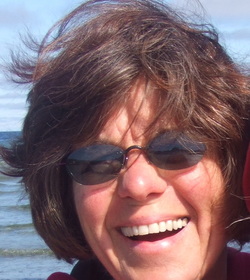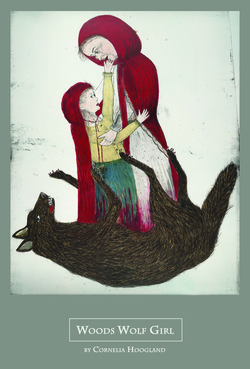 Cornelia Hoogland Cornelia HooglandPhoto by Hennie Aikman Woods Wolf Girl (Wolsak and Wynn, 2011) is CORNELIA HOOGLAND'S 6th book of poetry, and is based on the fairy tale, Red Riding Hood. Fountainhead Theatre in London Ontario is producing Red’s Canadian premiere in May 2013. Hoogland’s poetry, as well as her nonfiction, fiction and plays have been published and performed internationally. Cornelia has received writing awards from the Canada Council, Ontario Arts Council and selections from her 6 books of poetry, two chapbooks and nonfiction have won numerous literary competitions and have been shortlisted for various CBC literary competitions, the Relit awards, and the National Magazine Awards. Cornelia has taught writing and literature at the University of Western Ontario, UBC Okanagan, Simon Fraser University, and has led seminars, workshops and tutorials at festivals and school districts. She lives on Hornby Island with her visual artist husband Ted Goodden and dog Drummer. Visit Cornelia online at her website, at her Woods Wolf Girl site, and on Facebook. RUSTY TALK WITH CORNELIA HOOGLAND Kathryn Mockler: What is your first memory of writing creatively? Cornelia Hoogland: I remember tracing the colour blue from its starting point above the clouds, to the mountains, the ocean, the Douglas-fir trees, grains of sand, the beach towel and then the colour splintering into my child’s blue eyes. Speaking of one thing in terms of another – what a miracle is metaphor. The blue poem took place at Rathtrevor Beach on Vancouver Island 35 years ago. I lost that poem and yet—have lived it all these years. Following where the line, idea, colour, word takes me. KM: Why did you decide to become a poet/writer? CH: I received my first diary—one inch by two inches—when I was six. I wrote “Dad bought me a comic.” I am a journal keeper still. Every morning I get up and try to scratch out a few fresh lines. At the Banff Centre for the Arts, Adele Wiseman told my group: “You are all professionals; you’ve all sacrificed to be here in this program. You can call yourself a poet.” Okay, I thought. KM: Who are you reading now? CH: Dean Young, Tony Hoagland, Elizabeth Bishop and many other American poets both living and dead. Canadians Nancy Holmes, Julie Berry, Matt Radar. Alice Oswald, Jack Gilbert, David Harsent writers I admire. My daily literary experiences are often online, however. I read Poetry Daily and follow up the poems onto the Amazon or Google sites where I can read (often) more poems. KM: What do you feel influences your writing the most? CH: My antenna for lines, images, verbs, rhythm, dynamics, juxtaposition. Always on the look-out for the next poetic bread crumb. Reading and hearing other poets, and listening to children. Children say the best things, but I have a long ways to go to hear them properly. I also attend to wolves, dogs, crows. Learning how to write nature poetry, or use natural images, is one of our biggest literary challenge today. KM: Can you describe your writing process? How does revision figure into the process? CH: In writing and editing Woods Wolf Girl (Wolsak and Wynn, 2011), I realized more deeply than I did before the complex relationship between experience and form. Although the poems were written as monologues (Red, Mother, and the Woodsman), finding their voices was by way of delving more deeply into my own. KM: What is the best piece of writing advice you’ve been given that you use? CH: Understanding that poetry is a set of strategies (such as pattern, affect, density). Poetry doesn’t exist to teach us how to live (although it might) or even to show us the world we inhabit (though it might). Poetry is the dynamics of released energies, a dramatization of shaped energies. KM: What is your favourite or funniest literary moment, if you have one? CH: As the director of Poetry London in London, Ontario, I experienced many hilarious moments. Despite detailed emails to visiting poets outlining the program, the expectations, the times, directions and so forth, actually getting the writers from their cities to the London podium could involve tens of emails, an intricate cell phone game the days before and of the reading, great poetic anxiety about directions and schedule, food sensitivities revealed once seated at the restaurant, amazing requests to be driven to antique shops or delicatessens, and so forth. What I loved was the moment said famous authors walked on stage, they were immediately professional, engaging, charming, mannered and poised. The audience loved each of them; in fact, the more troublesome ones were the most sensational! Amazingly, hosts across Canada do similar work on any given night of the week and all for free. KM:Tell us about your play, Red. CH: Red is having its Canadian premiere on May 10–18, 2013, in London Ontario. Fountainhead Theatre is producing the play (John Gerry, director). Tickets available at onstagedirect.com I started writing the play using scenes from Woods Wolf Girl, but the play quickly took on a life of its own and bears little resemblance to the book. Red Riding Hood’s multiple identities throughout the ages, and the plethora of attitudes toward her inform this play. Innocent, sexual, chaste, (chased), unchaste, the girl to blame, fearless, the girl who ‘asked-for-it’, Red (the girl) is also the wolf, the wilderness is inside her. The character Red is not limited in costume, posture, attitude, or age. Arguably the world’s most popular, and most retold, fairy tale, interpreted into countless versions in over 40 different countries over the past nearly 400 years, it transcends cultural barriers. Red takes up complex human concerns, such as how good girls grow up, relationships between mothers and daughters, and the ongoing tensions between agent/victim, eating and/or being eaten. Who is caged, who is protected? (This play is suitable for high school audiences and adults.) For more information please see http://www.facebook.com/cornelia.hoogland. KM: What are you working on now? CH: Once again I am turning to the fairy tale for my inspiration. My multimedia project titled Woods Wolf You: A SoundWalk, is an audiowalk through the woods. Aimed to help create ecological awareness in young people as well as feelings of connectedness—ironically using the very technology (personal stereos) often blamed in alienating people from the physical world—the audio walk conjoins the technologies of sound, the power of the fairy tale Red Riding Hood, and site-specific performance. I’m delighted that London’s own Baseline Press will be publishing my chapbook, Sea Level, in 2013. Sea Level was shortlisted for the CBC literary nonfiction awards in 2012. Karen Schindler is creating one of the most exciting chapbook presses in Canada, and I’m delighted.  CORNELIA HOOGLAND'S RECENT POERTY BOOK Woods Wolf Girl, Wolsak and Wynn, 2011 From the Publisher: Cornelia Hoogland takes the story of Little Red Riding Hood and turns it inside out in this sensuous Canadian retelling. The woods and wolves are vivid and real, while Red herself is anything but a one dimensional girl-child. A meditation on innocence and its loss, and on the power of the green wilderness, Woods Wolf Girl uses striking lyric poetry to expose the heart of the original fairy tale. About Woods Wolf Girl: “Red Riding Hood like you’ve never encountered her before. Hoogland has nailed it in this chilling contemporary retelling of the age-old tale. Layered and smart as hell.” (Jeanette Lynes). Woods Wolf Girl is an arresting new book of poems from Cornelia Hoogland. The plot that threads through the poems draws from Red Riding Hood, but the story is ultimately Canadian. It is a lyrical work that exposes the wilderness of the Canadian landscape to a new immigrant, and shows the equally dangerous transition from girlhood to womanhood. Woods Wolf Girl retells the journey from mother’s house to grandmother’s house through the woods from the points of view of the girl and her immigrant mother. These poems occur on the path of experience: experience that may lurk in the form of wolf/men--who are especially dangerous to good girls. While the wolf is ultimately bad news (and then simply tired news, as in the scene in the grocery store), he initiates the girl into experience, the good with the bad. |
Rusty Talk
Rusty Talk Editor: Archives
November 2017
Categories
All
|

 RSS Feed
RSS Feed
